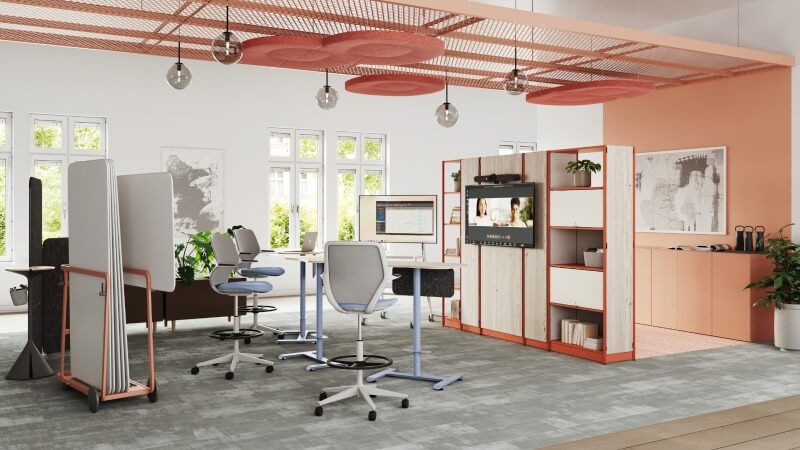Modular Office Furniture The Ultimate Guide
What is Modular Office Furniture?
Modular office furniture is a system of individual components that can be combined and reconfigured in various ways to create a customized workspace. Unlike traditional, fixed office furniture, modular pieces are designed to be adaptable and easily rearranged, making them ideal for evolving business needs and changing office layouts. This flexibility allows businesses to create unique and functional workspaces tailored to their specific requirements. The individual units often connect using simple mechanisms, allowing for seamless assembly and disassembly.
The Benefits of Choosing Modular Office Furniture
The advantages of modular furniture are numerous. Its adaptability means you can easily reconfigure your office layout to accommodate new employees, changing team structures, or different workflow needs. This flexibility reduces the need for costly and disruptive renovations when your space requirements change. Furthermore, modular systems often offer better value for money in the long run, as components can be added or replaced individually, avoiding the expense of replacing entire sets of furniture. The ability to adapt to changing needs also makes modular furniture a more sustainable choice, reducing waste associated with replacing entire office setups prematurely.

Different Types of Modular Office Furniture
The modular office furniture market offers a wide range of options. You’ll find modular desks, offering various sizes and configurations to suit individual needs, that can be combined to create large workstations or smaller, individual spaces. Modular storage solutions, such as shelving units and filing cabinets, provide adaptable storage capacity. Modular seating, including chairs and sofas, allows for flexibility in creating collaborative spaces or comfortable breakout areas. Even modular partitions and screens are available to create private offices or define different zones within a larger open-plan office.
Choosing the Right Modular System for Your Office
Selecting the right modular furniture system requires careful consideration of your specific needs. Begin by assessing your current and future space requirements. Consider the number of employees, the type of work performed, and the desired workflow. Think about the overall aesthetic you want to achieve and choose a system that complements your company culture and brand identity. Examine the quality and durability of the materials used, opting for robust and long-lasting components. Finally, research different suppliers and compare pricing and features before making a decision. Don’t hesitate to request samples or visit showrooms to assess the furniture firsthand.
Materials and Finishes: Finding the Perfect Look and Feel
Modular furniture is available in a vast array of materials and finishes. Popular choices include laminate, which is durable and cost-effective, wood veneer for a more natural and sophisticated look, and metal for industrial-chic designs. Consider the durability and maintenance requirements of different materials when making your selection. The finish can significantly impact the overall aesthetic of your office. Choose a finish that complements your existing décor or creates the desired atmosphere, whether it’s a sleek and modern look or a warm and inviting setting. Think about factors like color, texture, and sheen to achieve the perfect balance.
Installation and Maintenance of Modular Office Furniture
One of the key benefits of modular furniture is its ease of installation. Most systems are designed for straightforward assembly, often requiring minimal tools and expertise. Many suppliers offer installation services, but many systems are designed for simple self-assembly, which can save on costs. Regular maintenance is crucial to prolonging the life of your modular furniture. This involves regular cleaning to remove dust and dirt, and occasional tightening of connections to ensure stability. Addressing any damage promptly will prevent further deterioration and maintain the overall aesthetic and functionality of your workspace.
The Long-Term Cost Savings of Modular Furniture
While the initial investment in modular furniture might seem higher than traditional furniture, the long-term cost savings are significant. The adaptability reduces the need for frequent replacements and renovations. Individual components can be replaced or repaired as needed, reducing the overall cost of ownership. Furthermore, the flexibility allows for easier adaptation to changing business needs, minimizing disruption and associated expenses. This makes modular furniture a financially smart investment for businesses of all sizes that value long-term efficiency and cost-effectiveness.
Integrating Technology into Your Modular Workspace
Modern modular office furniture often integrates seamlessly with technology. Desks may incorporate cable management systems, power outlets, and data ports, simplifying the organization of technology and improving workspace ergonomics. Modular systems can also accommodate specialized technology such as interactive whiteboards or video conferencing equipment, creating a more dynamic and technologically advanced work environment. Choosing a system that is compatible with your current and future technological needs is crucial for optimizing productivity and efficiency.
Modular Furniture and Sustainability
Modular furniture plays a key role in creating a sustainable office environment. Its adaptability minimizes waste by reducing the need for frequent replacements. Many manufacturers use sustainable materials and manufacturing processes, contributing to environmental responsibility. The ability to reuse and
